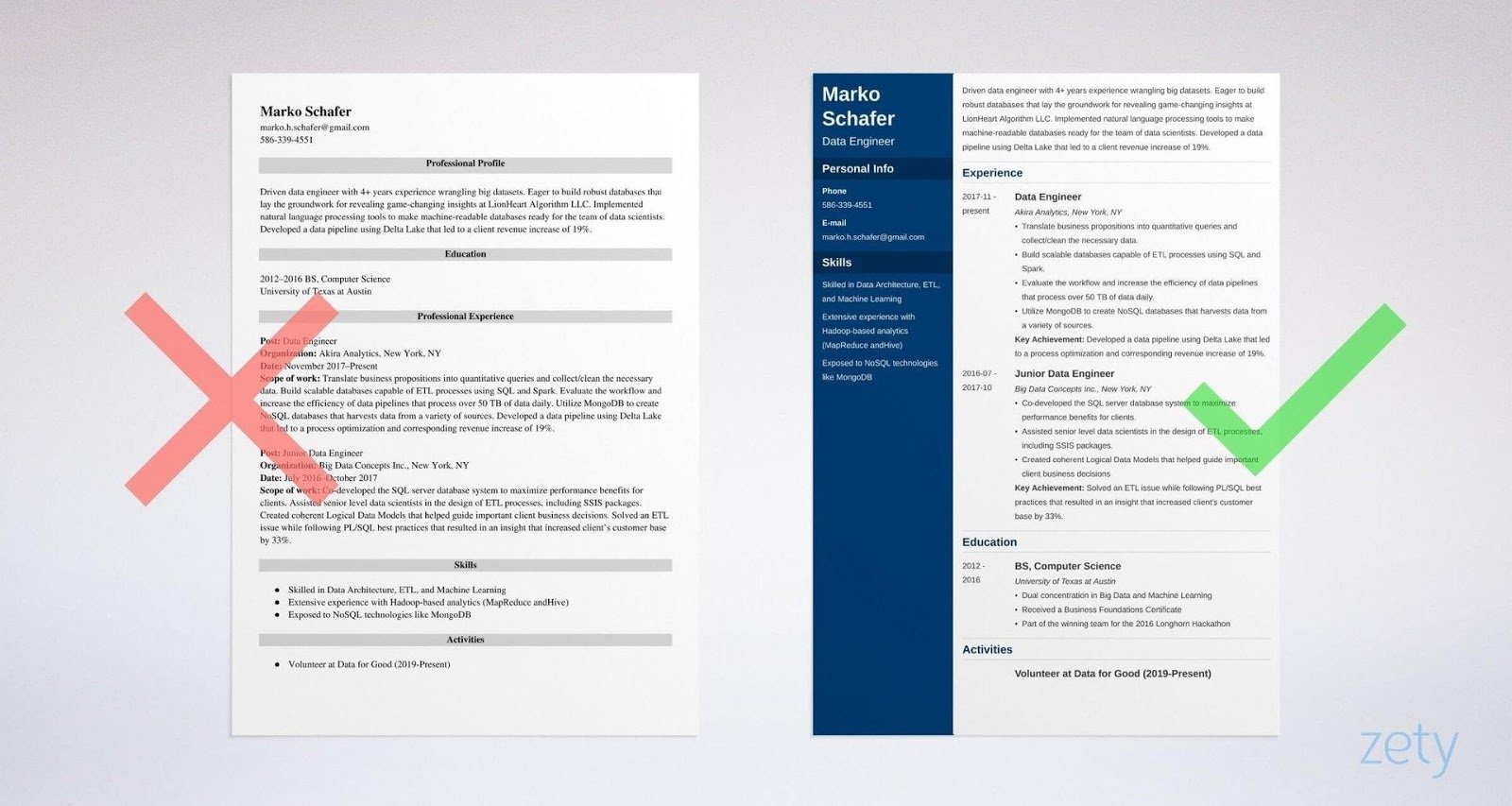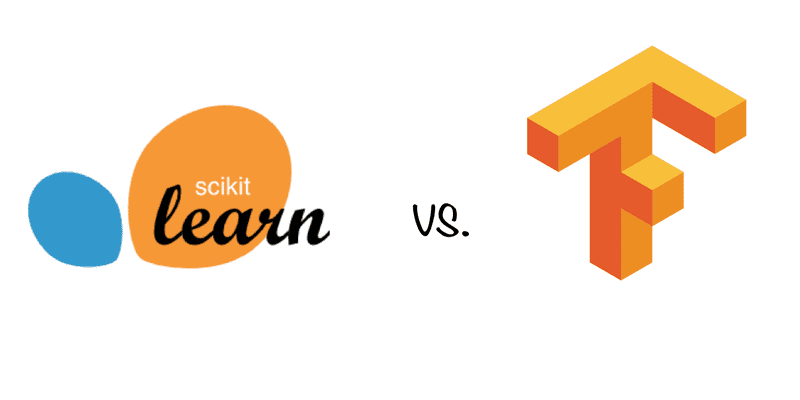In 2020, data engineering emerged as the fastest-growing tech occupation, beating out back-end development and senior data science. But the intense demand doesn’t make the data engineer career path any less competitive or the jobs any easier to get.
Companies depend on their data engineers to build and activate the data pipelines that power analytics. Each position requires specific skills, and each candidate brings different experiences and achievements. Learn how to highlight the connection between what the company needs and what you can offer with the help of these data engineer resume building tips and increase your chances of landing that interview.
3 Tips To Create an Impactful Data Engineer Resume
-
Highlight today’s in-demand skills
-
Don’t mention every tool
-
Be (very) specific
According to an eye-tracking study by career development group Ladders, Inc., hiring managers spend an average of 7.4 seconds looking at a resume. You need to catch their eyes quickly and definitively, proving that you have what it takes to power a company’s entire data system.
A resume is your initial interaction with an organization and a potential employer. While applying for any data engineer job, always ensure to customize your resume based on the job you are applying for. Creating a universal resume copy and bombarding job portals with the same copy, would do you no good.
We consulted our career coaches and curated these 3 tips to help you craft an impactful resume that would help you land your dream data engineering job.
1. Highlight today’s in-demand skills
Today’s data engineers need a broad set of skills, and hiring managers want to know that candidates are up to date. In 2020, when Google updated its data engineer learning track, it pointed specifically to the growth of two specific skill sets:
- Machine learning and AI (including dynamic programming, neural network architectures, algorithm optimization)
- Business intelligence (data analysis, industry trend analysis, and strategic planning, for example)
Companies increasingly demand these skills from data engineers and not just from data scientists. Since data engineers’ programming skills are more advanced when compared to data scientists‘. They are befitted for building high-availability production systems. Furthermore, data engineers implement machine learning algorithms for a suitable production environment. Hence, these ML and BI skills come in handy.
If you have these skills, there are several ways to indicate them on your resume:
- List competencies relevant to the job in your skills section
- Include machine learning, AI, or business intelligence training in your education section
- Describe projects and achievements that used these skills for previous jobs
Here is an example of how you can showcase your AI skills in your resume, courtesy of EnhanCV:

While reviewing your skills, organizations want to evaluate your skills competency and hence, they are looking to understand the impact you were able to bring using the skills and technologies you mention in your resume. Always ensure to highlight the final outcome of the project and your contribution towards the same.
2. Don’t mention every tool
As much as you want to show your versatility as a data engineer, hiring managers are primarily concerned with confirming you have the skills you’ll need with their company. Look at the job description, and make sure your skills section includes the capabilities the hiring company requests.
Don’t forget this step! Many top companies today use applicant tracking systems to screen resumes. An ATS will scan a resume for an exact match of the skill or experience the hiring manager told it to look for. The more named skills you have on your resume, the more likely you are to get in front of a hiring manager.
For example, here are the skill requirements for a data engineer job listed in April of 2021:

For this job, the ideal candidate’s skill section would explicitly mention:
- SQL
- Snowflake (AWS)
- AWS Redshift, Azure Data Warehouse (Synapse), or Google BigQuery
- Databricks
- Pandas
- Python
- Apache Spark
3. Be (very) specific
Data engineer skills are as precise as they come. Your resume should cover them as specifically and concisely as possible.
List the relevant programming languages, operating systems, and database solutions you’ve used, and highlight what those skills have allowed you to do. Don’t just say that you know Apache Kafka—describe a successful project you worked on using that tool.
Get To Know Other Data Science Students
Peter Liu
Business Intelligence Analyst at Indeed
Nick Lenczewski
Data Scientist at Ovative Group
Lou Zhang
Data Scientist at MachineMetrics
2 Essential Things All Hiring Managers Look For
Someone looking to hire a data engineer needs to see two key things: technical expertise and measurable results.
1. Technical expertise
According to QuantHub, data engineers need a core skillset that includes these 14 abilities:

Python is always worth listing since it’s a foundational language of data engineering and data science. On the database management side of things, make sure to mention SQL and NoSQL.
Beyond that, work backward from the job description and align what they want with these core skills. The more of the 14 skills mentioned above you can cover, the better. Here’s a great example:

This resume touches on almost all of the 14 core skills, including:
- Programming languages
- SQL
- Analytics
- Data optimization
- Creativity
- Collaboration
- DevOps
- Emerging technology (real-time)
2. Measurable results
When choosing which projects to feature on your data engineer resume, highlight those that drove real results for the company you worked for.
Revenue and cost savings statistics are ideal if you have them. If not, emphasize the impact your work had on other teams and on the organization as a whole.
For example, in the resume posted above, big data engineer, Carla Perez mentioned that she:
- Reduced the error rate in the data pipeline by 7%
- Reduced manual workload by 33% monthly
- Reduced latency by 12%
- Improved paid conversion by 7%
- Designed a data architecture that scaled to 90,000 users
Data Engineer Resume Examples
In the competitive world of data engineering, standing out means knowing what you’re up against. Here are three examples to show you what a top data engineer resume should look like.
Bad resume example:

This resume’s content isn’t the worst, though the writer could have been more specific in their skill section. The main problem is that it’s hard to read and doesn’t showcase right away the applicant’s capabilities and accomplishments.
Better resume example:
Look at the example on the right—it’s much easier to read and highlights skills as well as achievements. It shows:
- Relevant skills
- Projects and results
- Key accomplishments including statistics
Best resume example:
No offense to Marko Schafer, data engineer, but he may not get the job if he’s up against Stephen Greet:

This resume features:
- Specific tools with no “fluff”
- Measurable accomplishments directly linked to candidate skills
- Active verbs like “created” and “automated”
- A clean design that’s easy to read
It gets right to the point—this person knows his stuff.
Since you’re here…
Curious about a career in data science? Experiment with our free data science learning path, or join our Data Science Bootcamp, where you’ll get your tuition back if you don’t land a job after graduating. We’re confident because our courses work – check out our student success stories to get inspired.





